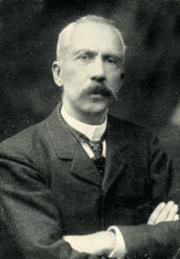- Charles Richet
-
Charles Richet 
Born August 25, 1850 Died December 4, 1935 (aged 85) Notable awards Nobel Prize in Physiology or Medicine (1913) Charles Robert Richet (August 25, 1850 – December 4, 1935) was a French physiologist who initially investigated a variety of subjects such as neurochemistry, digestion, thermoregulation in homeothermic animals, and breathing. He won the Nobel Prize "in recognition of his work on anaphylaxis" in 1913.[1]
He also devoted many years to the study of spiritualist phenomena.
Contents
Life
In 1887 Richet was named professor of physiology at the Collège de France, and in 1898 he became a member of the Académie de Médecine. It was, however, together with Paul Portier, their work on anaphylaxis (his term for a sensitized individual's sometimes lethal reaction to a second, small-dose injection of an antigen) that in 1913 won him the Nobel Prize for Physiology or Medicine. This research helped elucidate hay fever, asthma and other allergic reactions to foreign substances and explained some previously not understood cases of intoxication and sudden death. In 1914 he became a member of the Académie des Sciences.
Richet was a man of many interests, and his works included books about history, sociology, philosophy, psychology, as well as theatre plays and poetry. He was a pioneer in aviation.
He also had a deep interest in extrasensory perception and hypnosis. In 1884 Alexander Aksakov interested him in the medium Eusapia Palladino. In 1891 Richet founded the Annales des sciences psychiques. He kept in touch with renowned occultists and spiritists of his time such as Albert von Schrenck-Notzing, Frederic William Henry Myers and Gabriel Delanne.
In 1905 Richet was named president of the Society for Psychical Research in the United Kingdom, and coined the terms "ectoplasm." He experimented with Marthe Béraud, Elisabette D'Espérance, William Eglinton and Stefan Ossowiecki. In 1919 he became honorary president of the Institut Métapsychique International in Paris, and, in 1929, full-time president.
Works
Richet's works on parascientific subjects, which dominated his late years, include Traité de Métapsychique (Treatise on Metapsychics, 1922), Notre Sixième Sens (Our Sixth Sense, 1928), L'Avenir et la Prémonition (The Future and Premonition, 1931) and La grande espérance (The Great Hope, 1933).
- Richet, C. Traité de métapsychique (Paris, F. Alcan, 1922).
- Maxwell, J & Richet, C. Metapsychical phenomena: methods and observations (London : Duckworth, 1905).
See also
Notes
- ^ "The Nobel Prize in Physiology or Medicine 1913 Charles Richet". Nobelprize.org. http://nobelprize.org/nobel_prizes/medicine/laureates/1913/index.html. Retrieved 5 July 2010.
External links
- Short biography and bibliography in the Virtual Laboratory of the Max Planck Institute for the History of Science
- Richet's Dictionnaire de physiologie (1895-1928) as fullscan from the original
- Charles Robert Richet photo
- Charles Richet Biography on Nobel Prize website
- Short biography by Nandor Fodor on SurvivalAfterDeath.org.uk with links to several articles on psychical research
Nobel Laureates in Physiology or Medicine (1901–1925) - Emil Behring (1901)
- Ronald Ross (1902)
- Niels Finsen (1903)
- Ivan Pavlov (1904)
- Robert Koch (1905)
- Camillo Golgi / Santiago Ramón y Cajal (1906)
- Alphonse Laveran (1907)
- Élie Metchnikoff / Paul Ehrlich (1908)
- Emil Kocher (1909)
- Albrecht Kossel (1910)
- Allvar Gullstrand (1911)
- Alexis Carrel (1912)
- Charles Richet (1913)
- Robert Bárány (1914)
- Jules Bordet (1919)
- August Krogh (1920)
- Archibald Hill / Otto Meyerhof (1922)
- Frederick Banting / John Macleod (1923)
- Willem Einthoven (1924)
- Complete list
- (1901–1925)
- (1926–1950)
- (1951–1975)
- (1976–2000)
- (2001–2025)
Categories:- French physiologists
- Nobel laureates in Physiology or Medicine
- French Nobel laureates
- Hypnosis
- French occultists
- French writers on paranormal topics
- Parapsychologists
- 1850 births
- 1935 deaths
Wikimedia Foundation. 2010.
